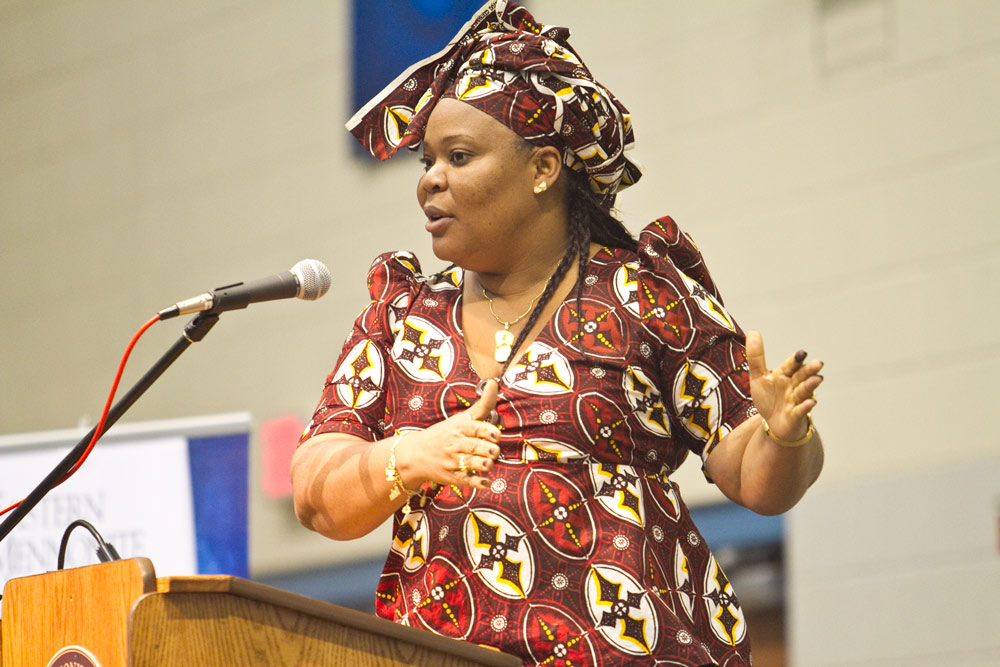Courtesy Daily News Record, Mar. 19, 2012
Leymah Gbowee’s journey to becoming a Nobel Peace laureate began, ironically enough, because she was angry.
Angry about the way women’s roles were reduced to little more than cooking, cleaning and taking care of the children. Angry about rampant rape and domestic abuse throughout her native Liberia. And angry about the country’s “senseless” civil war.
At James Madison University Saturday, Gbowee, a joint recipient of the 2011 Nobel Peace Prize, told those gathered for the 2012 International Student Leadership Conference how important that anger was — and even more significantly, how she channeled it into a constructive plan of action.
“You must be angry,” said Gbowee, who mobilized women into an influential peacebuilding movement in Liberia. “[But] when you’re angry, there should be no talks of revenge.”
Gbowee’s anger, instead, led her to create the Women of Liberia Mass Action for Peace movement. The non-violent organization — some 2,500 women strong — helped bring the second Liberian civil war to an end in 2003 after four years of conflict.
“The need for people to answer ‘yes’ to lead change is so great,” said Gbowee, who has been in the United States since Feb. 26 speaking on average at two events per day. “In order to see the change you want to see, you cannot [contribute to a movement]. You have to lead.”
Gbowee was awarded the Nobel Peace Prize in October along with Liberian President Ellen Johnson Sirleaf and Yemeni women’s rights activist Tawakkul Karman.
Local Ties
The weekend-long leadership conference, sponsored annually by JMU and Eastern Mennonite University, brought together about 200 international students and advisers from higher education institutions across the nation. Gbowee gave the event’s keynote address at JMU’s Festival Conference and Student Center Saturday morning, marking the second time she has visited the area since winning the Nobel. Even before her recent visits, Gbowee was no stranger to the central Valley. The 39-year-old earned a master’s degree in conflict transformation from EMU’s Center for Justice and Peacebuilding in 2007. And Gbowee’s son, Joshua Mensa, is currently an EMU sophomore.
Gbowee is also the co-founder of the Women Peace and Security Network-Africa and supported the creation of the Women in Peacebuilding Network. Her movements helped get Sirleaf elected the first female president of an African nation. Her work also was influential in creating a lawful definition for rape in Liberia, which previously did not have one. The west African country now has one of the strongest rape laws in the world, said Gbowee.
“I describe the world as upside down,” she said. “Good is seen as evil, evil is seen as good. People like yourself and myself [are] trying to tilt it upright through the tiny actions we do.”
Giving advice to college-aged leaders, Gbowee told them to be persistent, bold and selfless and to have focused goals.
“There is no way you can lead a change if it is all about you,” said Gbowee. “You cannot lead a change if you are not passionate about your issues because it is that passion that will wake you up when your knees are aching… when there’s no money in the bank account… [it will] keep your adrenaline pumping when you think about your work.”
As Gbowee regaled the audience with personal stories and advice, some audience members had barely noticed that 90 minutes had flown by.
“I didn’t feel time,” Lynchburg College freshman Karen Figueroa said with a look of awe on her face. “It’s the most inspiring thing I’ve ever heard in my life.”
As the event drew to a close, host Salorne McDonald asked students to “remember the words emblazoned on the back of your shirts.”
The words were a quote from Gbowee advising: “Don’t wait for a Gandhi, don’t wait for a King, don’t wait for a Mandela,” referring to a trio who are arguably best known peace activists of the 20th century. “You are your own Mandela, you are your own Gandhi, you are your own King.”

This lovely article reminded me of a quotation attributed to St. Augustine:
“Hope has two beautiful daughters. Their names are anger and courage; anger at the way things are, and courage to see that they do not remain the way they are.”
Definitely an inspiring woman and an inspiring speaker.
I was against last year’s Peace Prize award, but not against the individual laureates. Instead, I thought the award diminished the contributions of women by splitting it among three.